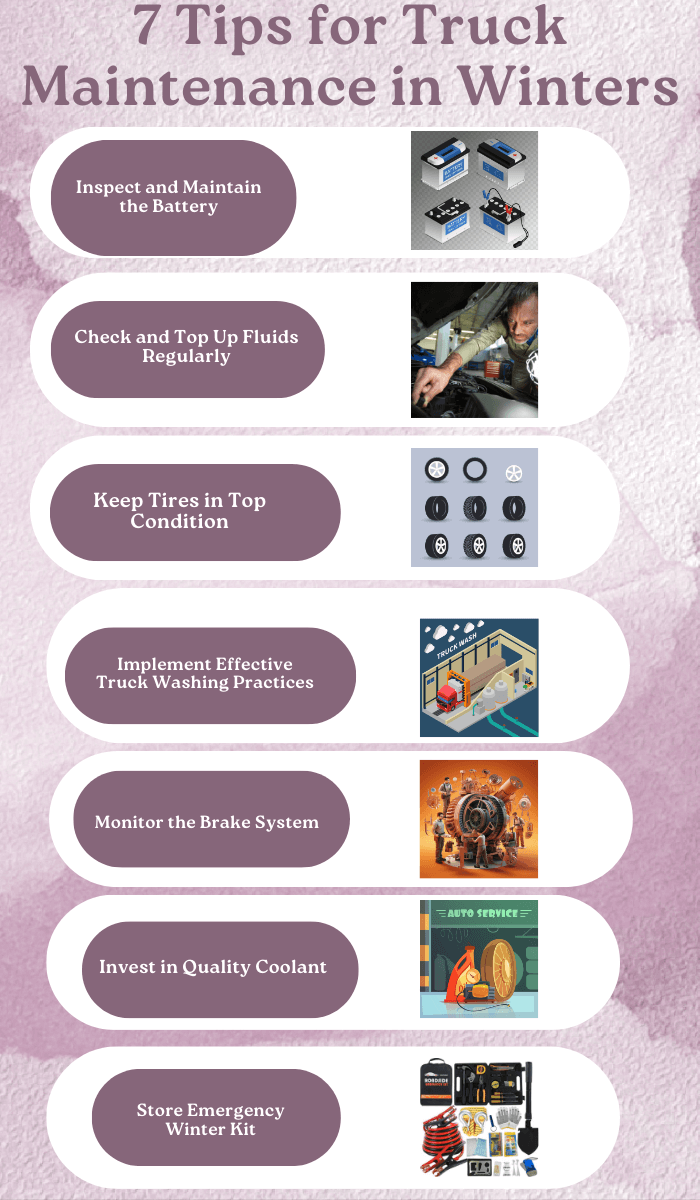Top 7 Winter Truck Maintenance Tips in 2024
June 26, 2024
Winters are particularly rough for trucks posing a significant risk to their work efficiency throughout the season. Cold temperatures, icy roads, and road salt are just a few examples of the potential hazards that can negatively impact their overall performance. Therefore, neglecting proper winter truck maintenance during the season is not an option.
This comprehensive guide will explore the seven tips for winter truck maintenance in winter seasons that allow trucks not to compromise their work efficiency and durability, even during unfavorable times.
Importance of Truck Maintenance in Winters
Our environment might profoundly impact machines and vehicles, causing them roughly. To compensate for all these risks, we brought the 7 essential truck maintenance tips in winter to drive the trucks for their longevity and durability. Investing time and effort in winter trucks can prevent breakdowns and save our pockets from costly repairs.

Tip 1: Inspect and Maintain the Battery
Before winter comes, ensure that crucial steps are taken to safeguard the truck battery and avoid unnecessary breakdowns. It is widespread that the winter season impacts the truck performance at the first level. Therefore, to prevent such problems, inspecting and maintaining the battery becomes crucial at the first go.
Steps to be Undertaken
- Preventing Corrosion: Battery cables and terminals can accumulate corrosion over time, which impacts the electric flow and potentially leads to starting issues. Hence, technicians must change the battery for a smooth experience.
- Detecting Leaks: Battery leaks must be checked, as they may create a huge mess inside the trucks. These leaks cause electrolyte loss and may damage the other parts near it.
Tip 2: Check and Top Up Fluids Regularly
Checking on fluids regularly is crucial in ensuring the longevity of the trucks which in turn fosters optimal performance. To keep overall performance grievance-free during the winter, ensure that your engine oil, transmission fluid, brake fluid, and coolant are at the recommended levels. These fluids help in lubrication in colder temperatures and provide safety while operating heavy-duty trucks.
Check here: The Top 5 Synthetic Truck Oil For Your Big Rig
Tip 3: Keep Tires in Top Condition
It is evident that well-maintained tires provide top-notch safety during the cold season, but getting tires is not enough, they require Truck Preventive maintenance services from time to time for improved work efficiency. There are specific steps recommended to maintain their health, like checking tire pressure regularly and considering switching on winter tires for enhanced traction. Replace tires if required, and always keep tire chains for added safety.
Tip 4: Implement Effective Truck Washing Practices
Frequent truck washing is highly recommended to remove salt and grime accumulated on the exterior. In this condition, it is better to use a high-quality truck wash for winter, ensuring a thorough undercarriage cleaning. This practice prevents rust and maintains vehicle aesthetics. Investing in a heated pressure washer can easily make the cleaning process effective.
Additional Tips for Truck Maintenance:
Regular Engine Checks: Regular checks and maintenance are recommended to ensure the truck’s engine is in optimal condition. This practice includes oil changes, checking fluid levels, inspecting belts and hoes, and more.
Tire Care: This portion is crucial, as we need to inspect tires regularly for proper inflation, tread wear, and alignment. Perfect tire maintenance ensures the best fuel efficiency and safe driving conditions in the long term.
Tip 5: Monitor the Brake System
It is important to check the brakes and maintain them in top condition for safe driving, especially during winter when road conditions can be unsafe. Here are some points to keep on the Truck Maintenance Checklist.
- Regular Inspections: Routinely check your brake pads, rotors, and brake fluid levels. Winter weather can exacerbate wear and tear, so staying on top of maintenance is crucial.
- Prompt Repairs: If you notice any brake issues, such as squeaking, grinding, or a spongy brake pedal, address them promptly. Delaying on repairs can compromise your safety, especially on icy or snowy roads.
- Winter-Grade Brake Fluid: Consider switching to winter-grade brake fluid, which performs better in low temperatures. This can help maintain optimal braking efficiency during the cold weather.
Tip 6: Invest in Quality Coolant
Coolants are crucial for engines, as they prevent engine coolant from freezing in low temperatures. It is recommended to check the coolant regularly and top it up as required. Using a high-quality coolant with corrosion inhibitors provides an extra layer of protection. Additionally, flush and replace the coolant according to the manufacturer’s recommendation to maintain optimal performance.
Tip 7: Store Emergency Winter Kit
It’s important to be prepared for unexpected situations by keeping an emergency kit in your truck. Include a blanket, extra clothing, non-perishable snacks, a flashlight, and a first aid kit. Being well-prepared can make a significant difference in case of a breakdown or unforeseen circumstances. Additionally, it’s wise to have tools like a tire repair kit, jumper cables, and a multi-tool for quick fixes.
Bonus Tips for Winter Truck Maintenance:
Check Electrical Systems: Inspect the truck’s electrical systems, including lights, wipers, and defrosters, to ensure they function correctly in the winter season.
Monitor Fuel Levels: Keep the fuel tank at least half-full to prevent fuel lines from freezing. Consider using winter additives for diesel fuel to prevent gelling.
Evaluate the Exhaust System: Always check the exhaust system for leaks or damage. A properly functioning exhaust system is crucial for vehicle safety and emissions.
Inspect the Suspension: Cold weather can severely impact the suspension system. It is recommended that you keep it secure and address any issues that persist.
Stay Informed: Always monitor weather forecasts and road conditions. Plan routes to avoid severe weather and road closures whenever possible.
Conclusion
By ensuring these practices throughout the winter seasons, can keep your truck in top-notch condition. From primary engine care to advanced detailing and washing, keeps the vehicle running smoothly and safely, no matter what the winter challenges. Implementing these points ensures a reliable and safe journey for both drivers and cargo.
